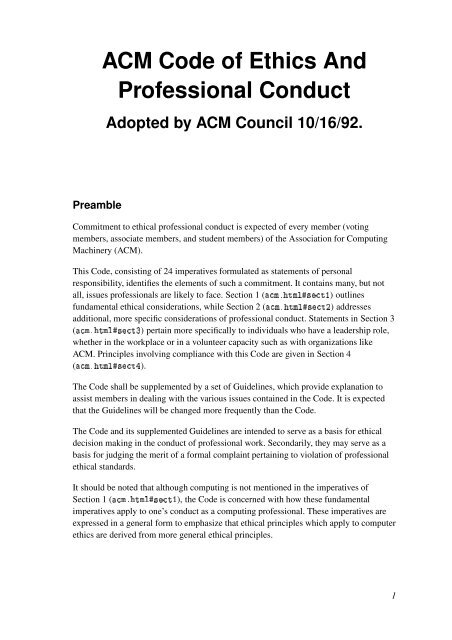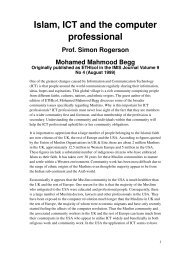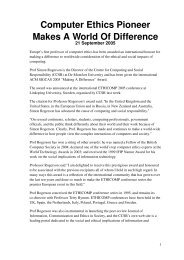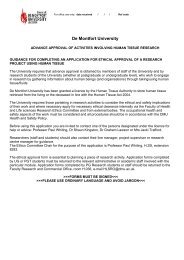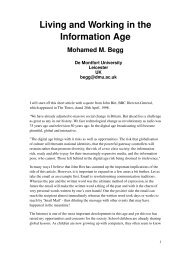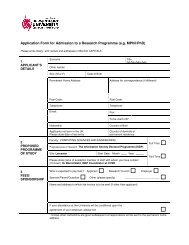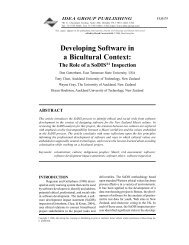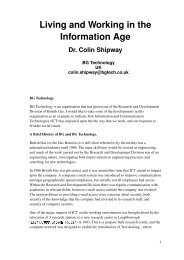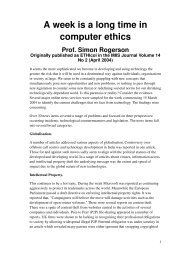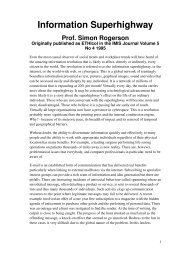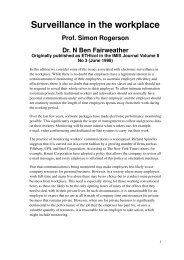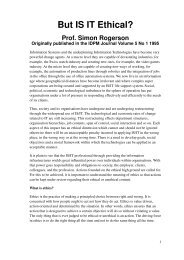ACM Code of Ethics And Professional Conduct - Centre for ...
ACM Code of Ethics And Professional Conduct - Centre for ...
ACM Code of Ethics And Professional Conduct - Centre for ...
You also want an ePaper? Increase the reach of your titles
YUMPU automatically turns print PDFs into web optimized ePapers that Google loves.
<strong>ACM</strong> <strong>Code</strong> <strong>of</strong> <strong>Ethics</strong> <strong>And</strong><br />
Pr<strong>of</strong>essional <strong>Conduct</strong><br />
Adopted by <strong>ACM</strong> Council 10/16/92.<br />
Preamble<br />
Commitment to ethical pr<strong>of</strong>essional conduct is expected <strong>of</strong> every member (voting<br />
members, associate members, and student members) <strong>of</strong> the Association <strong>for</strong> Computing<br />
Machinery (<strong>ACM</strong>).<br />
This <strong>Code</strong>, consisting <strong>of</strong> 24 imperatives <strong>for</strong>mulated as statements <strong>of</strong> personal<br />
responsibility, identifies the elements <strong>of</strong> such a commitment. It contains many, but not<br />
all, issues pr<strong>of</strong>essionals are likely to face. Section 1 ( ¢¡¤£¦¥¨§©£¢¡© ) outlines<br />
fundamental ethical considerations, while Section 2 ( ¢¡£¦¥¨§©£¢¡©¢ ) addresses<br />
additional, more specific considerations <strong>of</strong> pr<strong>of</strong>essional conduct. Statements in Section 3<br />
( ¢¡¤£¥¨§©£¢¡©¢ ) pertain more specifically to individuals who have a leadership role,<br />
whether in the workplace or in a volunteer capacity such as with organizations like<br />
<strong>ACM</strong>. Principles involving compliance with this <strong>Code</strong> are given in Section 4<br />
( ¢¡¤£¥¨§©£¢¡© ).<br />
The <strong>Code</strong> shall be supplemented by a set <strong>of</strong> Guidelines, which provide explanation to<br />
assist members in dealing with the various issues contained in the <strong>Code</strong>. It is expected<br />
that the Guidelines will be changed more frequently than the <strong>Code</strong>.<br />
The <strong>Code</strong> and its supplemented Guidelines are intended to serve as a basis <strong>for</strong> ethical<br />
decision making in the conduct <strong>of</strong> pr<strong>of</strong>essional work. Secondarily, they may serve as a<br />
basis <strong>for</strong> judging the merit <strong>of</strong> a <strong>for</strong>mal complaint pertaining to violation <strong>of</strong> pr<strong>of</strong>essional<br />
ethical standards.<br />
It should be noted that although computing is not mentioned in the imperatives <strong>of</strong><br />
Section 1 ( ¢¡£¦¥¨§©£¢¡© ), the <strong>Code</strong> is concerned with how these fundamental<br />
imperatives apply to one’s conduct as a computing pr<strong>of</strong>essional. These imperatives are<br />
expressed in a general <strong>for</strong>m to emphasize that ethical principles which apply to computer<br />
ethics are derived from more general ethical principles.<br />
1
<strong>ACM</strong> <strong>Code</strong> <strong>of</strong> <strong>Ethics</strong> <strong>And</strong> Pr<strong>of</strong>essional <strong>Conduct</strong><br />
It is understood that some words and phrases in a code <strong>of</strong> ethics are subject to varying<br />
interpretations, and that any ethical principle may conflict with other ethical principles in<br />
specific situations. Questions related to ethical conflicts can best be answered by<br />
thoughtful consideration <strong>of</strong> fundamental principles, rather than reliance on detailed<br />
regulations.<br />
1. General Moral Imperatives<br />
As an <strong>ACM</strong> member I will ....<br />
1.1 Contribute to society and human well-being<br />
This principle concerning the quality <strong>of</strong> life <strong>of</strong> all people affirms an obligation to protect<br />
fundamental human rights and to respect the diversity <strong>of</strong> all cultures. An essential aim <strong>of</strong><br />
computing pr<strong>of</strong>essionals is to minimize negative consequences <strong>of</strong> computing systems,<br />
including threats to health and safety. When designing or implementing systems,<br />
computing pr<strong>of</strong>essionals must attempt to ensure that the products <strong>of</strong> their ef<strong>for</strong>ts will be<br />
used in socially responsible ways, will meet social needs, and will avoid harmful effects<br />
to health and welfare.<br />
In addition to a safe social environment, human well-being includes a safe natural<br />
environment. There<strong>for</strong>e, computing pr<strong>of</strong>essionals who design and develop systems must<br />
be alert to, and make others aware <strong>of</strong>, any potential damage to the local or global<br />
environment.<br />
1.2 Avoid harm to others<br />
"Harm" means injury or negative consequences, such as undesirable loss <strong>of</strong> in<strong>for</strong>mation,<br />
loss <strong>of</strong> property, property damage, or unwanted environmental impacts. This principle<br />
prohibits use <strong>of</strong> computing technology in ways that result in harm to any <strong>of</strong> the<br />
following: users, the general public, employees, employers. Harmful actions include<br />
intentional destruction or modification <strong>of</strong> files and programs leading to serious loss <strong>of</strong><br />
resources or unnecessary expenditure <strong>of</strong> human resources such as the time and ef<strong>for</strong>t<br />
required to purge systems <strong>of</strong> "computer viruses."<br />
2
<strong>ACM</strong> <strong>Code</strong> <strong>of</strong> <strong>Ethics</strong> <strong>And</strong> Pr<strong>of</strong>essional <strong>Conduct</strong><br />
Well-intended actions, including those that accomplish assigned duties, may lead to<br />
harm unexpectedly. In such an event the responsible person or persons are obligated to<br />
undo or mitigate the negative consequences as much as possible. One way to avoid<br />
unintentional harm is to carefully consider potential impacts on all those affected by<br />
decisions made during design and implementation.<br />
To minimize the possibility <strong>of</strong> indirectly harming others, computing pr<strong>of</strong>essionals must<br />
minimize malfunctions by following generally accepted standards <strong>for</strong> system design and<br />
testing. Furthermore, it is <strong>of</strong>ten necessary to assess the social consequences <strong>of</strong> systems to<br />
project the likelihood <strong>of</strong> any serious harm to others. If system features are<br />
misrepresented to users, coworkers, or supervisors, the individual computing<br />
pr<strong>of</strong>essional is responsible <strong>for</strong> any resulting injury.<br />
In the work environment the computing pr<strong>of</strong>essional has the additional obligation to<br />
report any signs <strong>of</strong> system dangers that might result in serious personal or social damage.<br />
If one’s superiors do not act to curtail or mitigate such dangers, it may be necessary to<br />
"blow the whistle" to help correct the problem or reduce the risk. However, capricious or<br />
misguided reporting <strong>of</strong> violations can, itself, be harmful. Be<strong>for</strong>e reporting violations, all<br />
relevant aspects <strong>of</strong> the incident must be thoroughly assessed. In particular, the<br />
assessment <strong>of</strong> risk and responsibility must be credible. It is suggested that advice be<br />
sought from other computing pr<strong>of</strong>essionals. See principle 2.5 ( ¢¡¤£¦¥§©£ !£"#$¥&% )<br />
regarding thorough evaluations.<br />
1.3 Be honest and trustworthy.<br />
Honesty is an essential component <strong>of</strong> trust. Without trust an organization cannot function<br />
effectively. The honest computing pr<strong>of</strong>essional will not make deliberately false or<br />
deceptive claims about a system or system design, but will instead provide full disclosure<br />
<strong>of</strong> all pertinent system limitations and problems.<br />
A computer pr<strong>of</strong>essional has a duty to be honest about his or her own qualifications, and<br />
about any circumstances that might lead to conflicts <strong>of</strong> interest.<br />
Membership in volunteer organizations such as <strong>ACM</strong> may at times place individuals in<br />
situations where their statements or actions could be interpreted as carrying the "weight"<br />
<strong>of</strong> a larger group <strong>of</strong> pr<strong>of</strong>essionals. An <strong>ACM</strong> member will exercise care to not<br />
misrepresent <strong>ACM</strong> or positions and policies <strong>of</strong> <strong>ACM</strong> or any <strong>ACM</strong> units.<br />
3
<strong>ACM</strong> <strong>Code</strong> <strong>of</strong> <strong>Ethics</strong> <strong>And</strong> Pr<strong>of</strong>essional <strong>Conduct</strong><br />
1.4 Be fair and take action not to discriminate<br />
The values <strong>of</strong> equality, tolerance, respect <strong>for</strong> others, and the principles <strong>of</strong> equal justice<br />
govern this imperative. Discrimination on the basis <strong>of</strong> race, sex, religion, age, disability,<br />
national origin, or other such factors is an explicit violation <strong>of</strong> <strong>ACM</strong> policy and will not<br />
be tolerated.<br />
Inequities between different groups <strong>of</strong> people may result from the use or misuse <strong>of</strong><br />
in<strong>for</strong>mation and technology. In a fair society,all individuals would have equal<br />
opportunity to participate in, or benefit from, the use <strong>of</strong> computer resources regardless <strong>of</strong><br />
race, sex, religion, age, disability, national origin or other such similar factors. However,<br />
these ideals do not justify unauthorized use <strong>of</strong> computer resources nor do they provide an<br />
adequate basis <strong>for</strong> violation <strong>of</strong> any other ethical imperatives <strong>of</strong> this code.<br />
1.5 Honor property rights including copyrights and<br />
patent<br />
Violation <strong>of</strong> copyrights, patents, trade secrets and the terms <strong>of</strong> license agreements is<br />
prohibited by law in most circumstances. Even when s<strong>of</strong>tware is not so protected, such<br />
violations are contrary to pr<strong>of</strong>essional behavior. Copies <strong>of</strong> s<strong>of</strong>tware should be made only<br />
with proper authorization. Unauthorized duplication <strong>of</strong> materials must not be condoned.<br />
1.6 Give proper credit <strong>for</strong> intellectual property<br />
Computing pr<strong>of</strong>essionals are obligated to protect the integrity <strong>of</strong> intellectual property.<br />
Specifically, one must not take credit <strong>for</strong> other’s ideas or work, even in cases where the<br />
work has not been explicitly protected by copyright, patent, etc.<br />
1.7 Respect the privacy <strong>of</strong> others<br />
Computing and communication technology enables the collection and exchange <strong>of</strong><br />
personal in<strong>for</strong>mation on a scale unprecedented in the history <strong>of</strong> civilization. Thus there is<br />
increased potential <strong>for</strong> violating the privacy <strong>of</strong> individuals and groups. It is the<br />
responsibility <strong>of</strong> pr<strong>of</strong>essionals to maintain the privacy and integrity <strong>of</strong> data describing<br />
4
<strong>ACM</strong> <strong>Code</strong> <strong>of</strong> <strong>Ethics</strong> <strong>And</strong> Pr<strong>of</strong>essional <strong>Conduct</strong><br />
individuals. This includes taking precautions to ensure the accuracy <strong>of</strong> data, as well as<br />
protecting it from unauthorized access or accidental disclosure to inappropriate<br />
individuals. Furthermore, procedures must be established to allow individuals to review<br />
their records and correct inaccuracies.<br />
This imperative implies that only the necessary amount <strong>of</strong> personal in<strong>for</strong>mation be<br />
collected in a system, that retention and disposal periods <strong>for</strong> that in<strong>for</strong>mation be clearly<br />
defined and en<strong>for</strong>ced, and that personal in<strong>for</strong>mation gathered <strong>for</strong> a specific purpose not<br />
be used <strong>for</strong> other purposes without consent <strong>of</strong> the individual(s). These principles apply to<br />
electronic communications, including electronic mail, and prohibit procedures that<br />
capture or monitor electronic user data, including messages,without the permission <strong>of</strong><br />
users or bona fide authorization related to system operation and maintenance. User data<br />
observed during the normal duties <strong>of</strong> system operation and maintenance must be treated<br />
with strictest confidentiality, except in cases where it is evidence <strong>for</strong> the violation <strong>of</strong> law,<br />
organizational regulations, or this <strong>Code</strong>. In these cases, the nature or contents <strong>of</strong> that<br />
in<strong>for</strong>mation must be disclosed only to proper authorities. (See1.9)<br />
1.8 Honor confidentiality<br />
The principle <strong>of</strong> honesty extends to issues <strong>of</strong> confidentiality <strong>of</strong> in<strong>for</strong>mation whenever one<br />
has made an explicit promise to honor confidentiality or, implicitly, when private<br />
in<strong>for</strong>mation not directly related to the per<strong>for</strong>mance <strong>of</strong> one’s duties becomes available.<br />
The ethical concern is to respect all obligations <strong>of</strong> confidentiality to employers, clients,<br />
and users unless discharged from such obligations by requirements <strong>of</strong> the law or other<br />
principles <strong>of</strong> this <strong>Code</strong>.<br />
2. More Specific Pr<strong>of</strong>essional Responsibilities<br />
As an <strong>ACM</strong> computing pr<strong>of</strong>essional I will ....<br />
5
<strong>ACM</strong> <strong>Code</strong> <strong>of</strong> <strong>Ethics</strong> <strong>And</strong> Pr<strong>of</strong>essional <strong>Conduct</strong><br />
2.1 Strive to achieve the highest quality,<br />
effectiveness and dignity in both the process and<br />
products <strong>of</strong> pr<strong>of</strong>essional work<br />
Excellence is perhaps the most important obligation <strong>of</strong> a pr<strong>of</strong>essional. The computing<br />
pr<strong>of</strong>essional must strive to achieve quality and to be cognizant <strong>of</strong> the serious negative<br />
consequences that may result from poor quality in a system.<br />
2.2 Acquire and maintain pr<strong>of</strong>essional competence<br />
Excellence depends on individuals who take responsibility <strong>for</strong> acquiring and maintaining<br />
pr<strong>of</strong>essional competence. A pr<strong>of</strong>essional must participate in setting standards <strong>for</strong><br />
appropriate levels <strong>of</strong> competence, and strive to achieve those standards. Upgrading<br />
technical knowledge and competence can be achieved in several ways:doing independent<br />
study; attending seminars, conferences, or courses; and being involved in pr<strong>of</strong>essional<br />
organizations.<br />
2.3 Know and respect existing laws pertaining to<br />
pr<strong>of</strong>essional work<br />
<strong>ACM</strong> members must obey existing local, state,province, national, and international laws<br />
unless there is a compelling ethical basis not to do so. Policies and procedures <strong>of</strong> the<br />
organizations in which one participates must also be obeyed. But compliance must be<br />
balanced with the recognition that sometimes existing laws and rules may be immoral or<br />
inappropriate and, there<strong>for</strong>e, must be challenged. Violation <strong>of</strong> a law or regulation may be<br />
ethical when that law or rule has inadequate moral basis or when it conflicts with another<br />
law judged to be more important. If one decides to violate a law or rule because it is<br />
viewed as unethical, or <strong>for</strong> any other reason, one must fully accept responsibility <strong>for</strong><br />
one’s actions and <strong>for</strong> the consequences.<br />
6
<strong>ACM</strong> <strong>Code</strong> <strong>of</strong> <strong>Ethics</strong> <strong>And</strong> Pr<strong>of</strong>essional <strong>Conduct</strong><br />
2.4 Accept and provide appropriate pr<strong>of</strong>essional<br />
review<br />
Quality pr<strong>of</strong>essional work, especially in the computing pr<strong>of</strong>ession, depends on<br />
pr<strong>of</strong>essional reviewing and critiquing. Whenever appropriate,individual members should<br />
seek and utilize peer review as well as provide critical review <strong>of</strong> the work <strong>of</strong> others.<br />
2.5 Give comprehensive and thorough evaluations<br />
<strong>of</strong> computer systems and their impacts, including<br />
analysis <strong>of</strong> possible risks<br />
Computer pr<strong>of</strong>essionals must strive to be perceptive, thorough, and objective when<br />
evaluating, recommending, and presenting system descriptions and alternatives.<br />
Computer pr<strong>of</strong>essionals are in a position <strong>of</strong> special trust, and there<strong>for</strong>e have a special<br />
responsibility to provide objective, credible evaluations to employers, clients, users, and<br />
the public. When providing evaluations the pr<strong>of</strong>essional must also identify any relevant<br />
conflicts <strong>of</strong> interest, as stated in imperative 1.3 ( ¢¡¤£¦¥¨§©£' ¤£"()¥* ).<br />
As noted in the discussion <strong>of</strong> principle 1.2 ( ¢¡¤£¦¥¨§©£' ¤£"()¥+ ) on avoiding harm, any<br />
signs <strong>of</strong> danger from systems must be reported to those who have opportunity and/or<br />
responsibility to resolve them. See the guidelines <strong>for</strong> imperative 1.2 ( #¡¤£¦¥¨§©,£' !£"()¥+ )<br />
<strong>for</strong> more details concerning harm,including the reporting <strong>of</strong> pr<strong>of</strong>essional violations.<br />
2.6 Honor contracts, agreements, and assigned<br />
responsibilities<br />
Honoring one’s commitments is a matter <strong>of</strong> integrity and honesty.For the computer<br />
pr<strong>of</strong>essional this includes ensuring that system elements per<strong>for</strong>m as intended. Also,<br />
when one contracts <strong>for</strong> work with another party, one has an obligation to keep that party<br />
properly in<strong>for</strong>med about progress toward completing that work.<br />
A computing pr<strong>of</strong>essional has a responsibility to request a change in any assignment that<br />
he or she feels cannot be completed as defined. Only after serious consideration and with<br />
full disclosure <strong>of</strong> risks and concerns to the employer or client, should one accept the<br />
assignment. The major underlying principle here is the obligation to accept personal<br />
7
<strong>ACM</strong> <strong>Code</strong> <strong>of</strong> <strong>Ethics</strong> <strong>And</strong> Pr<strong>of</strong>essional <strong>Conduct</strong><br />
accountability <strong>for</strong> pr<strong>of</strong>essional work. On some occasions other ethical principles may<br />
take greater priority.<br />
A judgment that a specific assignment should not be per<strong>for</strong>med may not be accepted.<br />
Having clearly identified one’s concerns and reasons <strong>for</strong> that judgment, but failing to<br />
procure a change in that assignment, one may yet be obligated, by contract or by law, to<br />
proceed as directed. The computing pr<strong>of</strong>essional’s ethical judgment should be the final<br />
guide in deciding whether or not to proceed. Regardless <strong>of</strong> the decision, one must accept<br />
the responsibility <strong>for</strong> the consequences.<br />
However, per<strong>for</strong>ming assignments "against one’s own judgment" does not relieve the<br />
pr<strong>of</strong>essional <strong>of</strong> responsibility <strong>for</strong> any negative consequences.<br />
2.7 Improve public understanding <strong>of</strong> computing and<br />
its consequences<br />
Computing pr<strong>of</strong>essionals have a responsibility to share technical knowledge with the<br />
public by encouraging understanding <strong>of</strong> computing, including the impacts <strong>of</strong> computer<br />
systems and their limitations. This imperative implies an obligation to counter any false<br />
views related to computing.<br />
2.8 Access computing and communication<br />
resources only when authorized to do so.<br />
Theft or destruction <strong>of</strong> tangible and electronic property is prohibited by imperative 1.2<br />
( ¢¡¤£¥¨§©£' !£"(-¥+ ) - "Avoid harm to others." Trespassing and unauthorized use <strong>of</strong> a<br />
computer or communication system is addressed by this imperative. Trespassing<br />
includes accessing communication networks and computer systems, or accounts and/or<br />
files associated with those systems, without explicit authorization to do so. Individuals<br />
and organizations have the right to restrict access to their systems so long as they do not<br />
violate the discrimination principle (see 1.4) ( #¡¤£¦¥¨§©,£' !£".¥/)¥0 ). No one should enter<br />
or use another’s computer system, s<strong>of</strong>tware, or data files without permission. One must<br />
always have appropriate approval be<strong>for</strong>e using system resources, including .rm57<br />
communication ports, file space, other system peripherals, and computer time.<br />
8
<strong>ACM</strong> <strong>Code</strong> <strong>of</strong> <strong>Ethics</strong> <strong>And</strong> Pr<strong>of</strong>essional <strong>Conduct</strong><br />
3. Organizational Leadership Imperatives<br />
As an <strong>ACM</strong> member and an organizational leader, I will ....<br />
Background Note:<br />
This section draws extensively from the draft IFIP <strong>Code</strong> <strong>of</strong> <strong>Ethics</strong>,especially its sections<br />
on organizational ethics and international concerns. The ethical obligations <strong>of</strong><br />
organizations tend to be neglected in most codes <strong>of</strong> pr<strong>of</strong>essional conduct, perhaps<br />
because these codes are written from the perspective <strong>of</strong> the individual member. This<br />
dilemma is addressed by stating these imperatives from the perspective <strong>of</strong> the<br />
organizational leader. In this context"leader" is viewed as any organizational member<br />
who has leadership or educational responsibilities. These imperatives generally may<br />
apply to organizations as well as their leaders. In this context"organizations" are<br />
corporations, government agencies,and other "employers," as well as volunteer<br />
pr<strong>of</strong>essional organizations.<br />
3.1 Articulate social responsibilities <strong>of</strong> members <strong>of</strong><br />
an organizational unit and encourage full<br />
acceptance <strong>of</strong> those responsibilities<br />
Because organizations <strong>of</strong> all kinds have impacts on the public, they must accept<br />
responsibilities to society. Organizational procedures and attitudes oriented toward<br />
quality and the welfare <strong>of</strong> society will reduce harm to members <strong>of</strong> the public, thereby<br />
serving public interest and fulfilling social responsibility. There<strong>for</strong>e,organizational<br />
leaders must encourage full participation in meeting social responsibilities as well as<br />
quality per<strong>for</strong>mance.<br />
3.2 Manage personnel and resources to design and<br />
build in<strong>for</strong>mation systems that enhance the quality<br />
<strong>of</strong> working life<br />
Organizational leaders are responsible <strong>for</strong> ensuring that computer systems enhance, not<br />
degrade, the quality <strong>of</strong> working life. When implementing a computer system,<br />
9
<strong>ACM</strong> <strong>Code</strong> <strong>of</strong> <strong>Ethics</strong> <strong>And</strong> Pr<strong>of</strong>essional <strong>Conduct</strong><br />
organizations must consider the personal and pr<strong>of</strong>essional development, physical safety,<br />
and human dignity <strong>of</strong> all workers. Appropriate human-computer ergonomic standards<br />
should be considered in system design and in the workplace.<br />
3.3 Acknowledge and support proper and<br />
authorized uses <strong>of</strong> an organization’s computing and<br />
communication resources<br />
Because computer systems can become tools to harm as well as to benefit an<br />
organization, the leadership has the responsibility to clearly define appropriate and<br />
inappropriate uses <strong>of</strong> organizational computing resources. While the number and scope<br />
<strong>of</strong> such rules should be minimal, they should be fully en<strong>for</strong>ced when established.<br />
3.4 Ensure that users and those who will be affected<br />
by a system have their needs<br />
clearly articulated during the assessment and design <strong>of</strong> requirements; later the system<br />
must be validated to meet requirements.<br />
Current system users, potential users and other persons whose lives may be affected by a<br />
system must have their needs assessed and incorporated in the statement <strong>of</strong> requirements.<br />
System validation should ensure compliance with those requirements.<br />
3.5 Articulate and support policies that protect the<br />
dignity <strong>of</strong> users and others effected by a computing<br />
system<br />
Designing or implementing systems that deliberately or inadvertently demean<br />
individuals or groups is ethically unacceptable. Computer pr<strong>of</strong>essionals who are in<br />
decision making positions should verify that systems are designed and implemented to<br />
protect personal privacy and enhance personal dignity.<br />
10
<strong>ACM</strong> <strong>Code</strong> <strong>of</strong> <strong>Ethics</strong> <strong>And</strong> Pr<strong>of</strong>essional <strong>Conduct</strong><br />
3.6 Create opportunities <strong>for</strong> members <strong>of</strong> the<br />
organization to learn the principles and limitations<br />
<strong>of</strong> computer systems.<br />
This complements the imperative on public understanding (2.7) ( ¢¡¤£¦¥§©£ !£"#$¥+1 ).<br />
Educational opportunities are essential to facilitate optimal participation <strong>of</strong> all<br />
organizational members. Opportunities must be available to all members to help them<br />
improve their knowledge and skills in computing, including courses that familiarize them<br />
with the consequences and limitations <strong>of</strong> particular types <strong>of</strong> systems.In particular,<br />
pr<strong>of</strong>essionals must be made aware <strong>of</strong> the dangers <strong>of</strong> building systems around<br />
oversimplified models, the improbability <strong>of</strong> anticipating and designing <strong>for</strong> every possible<br />
operating condition, and other issues related to the complexity <strong>of</strong> this pr<strong>of</strong>ession.<br />
4. Compliance with the <strong>Code</strong><br />
As an <strong>ACM</strong> member I will ....<br />
4.1 Uphold and promote the principles <strong>of</strong> this <strong>Code</strong><br />
The future <strong>of</strong> the computing pr<strong>of</strong>ession depends on both technical and ethical excellence.<br />
Not only is it important <strong>for</strong> <strong>ACM</strong> computing pr<strong>of</strong>essionals to adhere to the principles<br />
expressed in this <strong>Code</strong>, each member should encourage and support adherence by other<br />
members.<br />
4.2 Treat violations <strong>of</strong> this code as inconsistent with<br />
membership in the <strong>ACM</strong><br />
Adherence <strong>of</strong> pr<strong>of</strong>essionals to a code <strong>of</strong> ethics is largely a voluntary matter. However, if<br />
a member does not follow this code by engaging in gross misconduct, membership in<br />
<strong>ACM</strong> may be terminated.<br />
11
<strong>ACM</strong> <strong>Code</strong> <strong>of</strong> <strong>Ethics</strong> <strong>And</strong> Pr<strong>of</strong>essional <strong>Conduct</strong><br />
Acknowledgements<br />
This <strong>Code</strong> and the supplemental Guidelines were developed by the Task Force <strong>for</strong> the<br />
Revision <strong>of</strong> the <strong>ACM</strong> <strong>Code</strong> <strong>of</strong> <strong>Ethics</strong> and Pr<strong>of</strong>essional <strong>Conduct</strong>: Ronald E. <strong>And</strong>erson,<br />
Chair, Gerald Engel, Donald Gotterbarn, Grace C. Hertlein, Alex H<strong>of</strong>fman, Bruce Jawer,<br />
Deborah G. Johnson, Doris K. Lidtke, Joyce Currie Little, Dianne Martin, Donn B.<br />
Parker, Judith A. Perrolle, and Richard S. Rosenberg. The Task Force was organized by<br />
<strong>ACM</strong>/SIGCAS and funding was provided by the <strong>ACM</strong> SIG Discretionary Fund. This<br />
<strong>Code</strong> and the supplemental Guidelines were adopted by the <strong>ACM</strong> Council on October<br />
16, 1992.<br />
12


